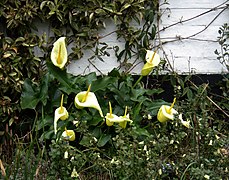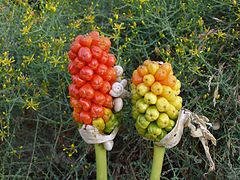Biology:Arum creticum
| Arum creticum | |
|---|---|

| |
| Scientific classification | |
| Kingdom: | Plantae |
| Clade: | Tracheophytes |
| Clade: | Angiosperms |
| Clade: | Monocots |
| Order: | Alismatales |
| Family: | Araceae |
| Genus: | Arum |
| Species: | A. creticum
|
| Binomial name | |
| Arum creticum Boiss. & Heldr. (1854)
| |
Arum creticum, the Cretan arum, is a species in the flowering plant family Araceae, native to the Greek island of Crete (Kriti), the Eastern Aegean Islands, and southwestern Turkey. This semi-evergreen clump-forming tuberous perennial has large arrow-shaped leaves. Erect folded-back spathes of fragrant yellow or cream appear in spring, with longer narrow spadices of a darker yellow. The flowers are followed in autumn by clusters of red or orange fruit.[1] The plant reaches 50 cm (20 in) tall and broad.
Arum creticum is cultivated as an ornamental plant in temperate gardens. It is hardy but requires a sheltered position in sun or partial shade, with moist soil.
Caution should be exercised when handling it, as it is an irritant and toxic if ingested.[2]
References
Wikidata ☰ Q1486756 entry
 |




